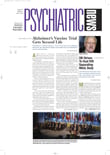Autism is generally considered to be a neuropsychiatric disorder. Yet it also seems to involve some immune system abnormalities, suggest new findings reported at the Fourth International Meeting for Autism Research, held in Boston in May.
The abnormalities concern both B cells (which make antibodies) and cytokines (proteins that respond to viruses, bacteria, and other antigens; engage in cross-talk between immune cells and neurons; and affect mood and behavior).
The results come from David Amaral, Ph.D., Judy Van de Water, Ph.D., and co-workers. Amaral, a neuroscientist who specializes in the study of the autistic brain, is research director of the University of California at Davis M.I.N.D. Institute. Van de Water is an immunologist at the M.I.N.D. Institute.
Amaral and a colleague recruited 70 children with autism and 35 normally developing children aged 4 to 6 for their study.
They drew a sample of blood from each subject, examined each sample for the number of B cells present, and then compared the number of B cells in the blood of the autism subjects with the number in the blood of the healthy subjects.
They found about 20 percent more B cells in the blood from the autism subjects than in the blood from the healthy ones.
Van de Water and her co-workers drew blood samples from autism subjects and from normally developing subjects aged 2 to 5, incubated the blood samples with viral and bacterial antigens, and then determined how many cytokines were produced in the samples in response to the antigens. They found that fewer cytokines were produced in the blood from the autism subjects than in the blood from the healthy ones.
What such immune anomalies mean remains to be determined. For example, might an abnormally large number of B cells in the blood and a decreased response of cytokines to antigen provocation play a role in autism's causation? And if such immune quirks do play a role in the development of autism, is that so in all cases or only in some?
“I think we are getting more and more convinced that autism is a multiple causal disorder... whether the immune system is involved or not,” Amaral said at a press conference in conjunction with the autism meeting. “Thirty percent of kids with autism have seizures, but 70 percent don't.... A certain percentage of children have severe gastrointestinal problems, but some don't.... There is a regressive form versus a more innate form; our best guess now is that the regressive form is 20 percent to 30 percent.”
He added that in one of the M.I.N.D. Institute's new projects, researchers“ will evaluate 1,800 children [with autism] at all levels—genes, the immune system, the brain—so that we can become more knowledgeable about how many subtypes there are.”
Eventually those immune anomalies flagged in autism subjects might turn out to be early diagnostic markers for the disorder—something that does not currently exist. And the reason why a biological test for autism at birth could be so valuable, Amaral said, is that it would then put scientists in a position of intervening at this very early date, when the brain is still maturing.
In fact, Amaral envisions that a biological test for autism at birth might be useful for preventing autism in children who are susceptible to the regressive form of the illness—the kind that develops between ages 2 and 3.
In other words, “Such children may be born with a vulnerability to autism, but not doomed to get it,” he explained. “Something in the environment may be a second hit. So if one could detect at birth those children who are vulnerable and at the same time understand more about what it is in the environment that triggers autism, it might be possible to keep those children from ever experiencing the trigger and thus prevent their autism.” ▪
